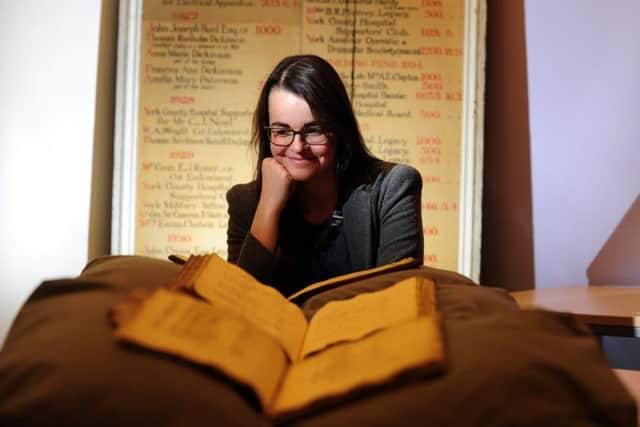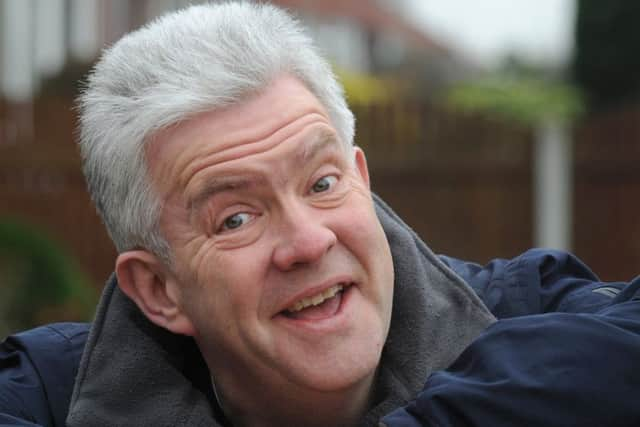What launch of new Yorkshire Historic Dictionary can tell us about county's past
There can be few people better suited to unveil a dictionary of the Yorkshire language than poet and writer Ian McMillan. Nicknamed the bard of Barnsley bard, the wordsmith calls God’s Own Country his home and makes clear his fondness of its regional dialect.
More than a decade has passed since he published his own book on the Yorkshire tongue - Chelp and Chunter: How to Talk Tyke - but his interest in his native variety of English has not wavered, and it is this he will discuss at a talk tomorrow to celebrate the launch of new online resource, the Yorkshire Historic Dictionary.


Advertisement
Hide AdAdvertisement
Hide AdProduced in a 15-month project by the Borthwick Institute for Archives at the University of York, the dictionary covers a period from around 1100 to 1750AD, its 4,000 plus terms offering insight into the region’s language and culture over time.
“The dictionary is a fantastic door into this massive Yorkshire house that’s full of all sorts of things,” says Ian. Born, and still living, in the South Yorkshire village of Darfield, his own accent is easily distinguishable. Dialect is evident in some of his poetry too - in both the words that he uses and the way that he says them, as well as in how he forms his sentences. “I can’t help it. Barnsley is what I think with. Dialect words are what I think with.”
There’s a myth that dialect is disappearing, he tells me, and though language is continually changing, he stresses that it is not the case. Still, he believes words of this great county past and present should be celebrated.
And perhaps that is why he has taken it upon himself to try to bring back into wider usage terms like the rather onomatopoeic adjective ‘lenerky’- meaning soft or floppy, and ‘grod’ - an alternative noun for a push bike, which had him baffled when he first heard it said down the road in Doncaster. “I’m always excited and keen to do anything to do with dialect,” he explains. “I thought what better way to start the new year than with a few dialect words. The idea of a Yorkshire dictionary struck me as fantastic and it felt like it was an important time to do it.”


Advertisement
Hide AdAdvertisement
Hide AdThe dictionary’s words are time machines, he tells me. “They instantly transport us back to a time when the words were still in common parlance. The people that spoke these didn’t think they were speaking in dialect. They were just talking.”
The dictionary reveals much about the county throughout history, providing a window into the environment, trades and industries of a bygone era. “It is part of our shared identity and heritage of the county as a whole,” says Alexandra Medcalf, project archivist at the Borthwick Institute.
“It is easy to say that these words haven’t been used for 250 years at least, and sometimes we can only guess at the meaning from the context, but that’s all part of Yorkshire’s past. And I think most people in Yorkshire are very proud of being from Yorkshire and being from this history.”
Many words served a practical and descriptive purpose at a time they were needed, labelling specialised tools and processes. Take ‘wash’ or ‘old wash’, for example, which referred to human urine used in the cloth making process, or ‘clatch’ - a device in which colliers sat as they were taken up and down the pit shaft.
Advertisement
Hide AdAdvertisement
Hide AdIt is multi-purpose dialect word ‘heck’ that is a favourite for Alexandra though. Referring to an object constructed with wooden bars, it is found in the likes of ‘cheese heck’ - a rack for cheese; ‘flood-heck’ - a flood gate; and ‘fish-heck’ - a contraption used to catch fish in dams and rivers.
Some words - ‘Godslove’, meaning an illegitimate child, for one - are rather poetic. Others, including nicknames like ‘Fatlad’ and ‘Bullyfrogge’, provide an appreciation of the medieval sense of humour. Many more offer an insight into how Yorkshire developed its variety with influences from other languages. Their usage in historical sources can help plot the movement of people and industries in the region, with certain words appearing along trade routes.
“There are clear influences from French, the Low Countries and Scandinavia present in the dictionary,” Alexandra explains. “Some of these may be hang-overs from wider influence on English from Viking and Norman invasions. For example, Scandinavian words like ‘wath’ for a ford or ‘by’ for a village or farmstead occur widely in Yorkshire place-names and suggest a longer linguistic connection, perhaps from the founding of the community. But you can also see the later input from Yorkshire’s wide trade network.”
The terms ‘clabbord’ or ‘clapholt’, for instance, were used to refer to split oak boards from the Baltic, ‘levant’ described a type of linen imported from the Low Countries, and ‘dogdrave’ was used to label a catch of fish in the North Sea, likely taken from ‘drave’ for a fishing expedition and ‘dogge’, a Dutch word for cod.
Advertisement
Hide AdAdvertisement
Hide Ad“The word landing for a place where a boat can be pulled up out of the water is also of Scandinavian origin and was formerly common around the Ouse and its tributaries,” Alexandra tells me. “In York, Lendal Bridge marks the site of St Leonard’s Landing, where materials were off-loaded to build the Minster, and Riccall Landing and Old Landing are traditionally seen as the place where the Scandinavian fleet was moored prior to the battle at Stamford Bridge.”
Since November 2017, Alexandra has been painstakingly pulling together and editing the dictionary, which is built on the work of Dr George Redmonds.
For more than sixty years, he researched the history of Yorkshire, specialising in the origin of surnames and place names and amassing an impressive catalogue of thousands of words and phrases, carefully recorded on index cards, complete with a definition and source references.
The dictionary project, carried out in partnership with the Yorkshire Archaeological and Historical Society, is a memorial to Bradford-born Dr Redmonds’ lifelong friend and collaborator, historian Professor David Hey. It has been funded by the Marc Fitch Foundation, of which Professor Hey, who died in 2016, was a former chairman.
Advertisement
Hide AdAdvertisement
Hide Ad“[Dr Redmonds] had all the words handwritten on research cards,” says Alexandra. “He spent a year typing it all up. It was all in shorthand. He did that in the year before we started, to make sure someone could come in and understand it all. Actually, it was a really well-timed project because he sadly died [last year] and now the project will be a memorial to him as well as Professor Hey.”
“We are happy that he knew [the project] was underway and it was going to come to fruition,” she adds. “But it’s really sad that he has not been able to see it finished. We are hoping it can be a celebration of all that he achieved throughout his career.”
The legacy will be revealed at the launch event, which will take place tomorrow, January 11, at the University of York.
Ian McMillan will talk about language, history and creativity and the place that dialect holds in his life.
Advertisement
Hide AdAdvertisement
Hide AdWith the audience, he will also make a dialect poem using words from the new dictionary.
Those in attendance will also be able to see a digital installation created by university students and inspired by the dictionary’s contents.
It is hoped that the dictionary, which can be searched by word, place, source and date, can continue to expand and develop and people are able to make submissions to its researchers.
There are also plans to publish the a hard copy of the Yorkshire Historic Dictionary later in the year.
To browse the dictionary online, visit yorkshiredictionary.york.ac.uk
